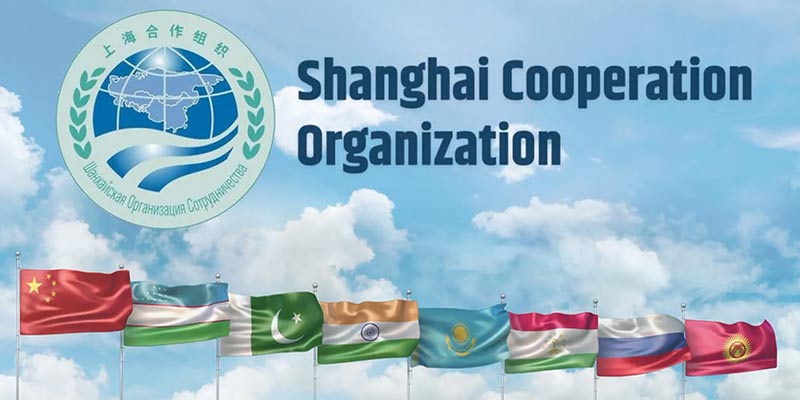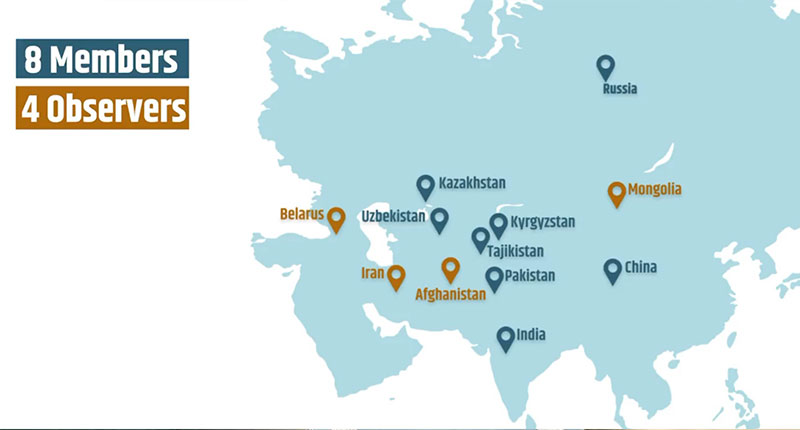- India
- Sep 17
Uzbekistan hands over SCO presidency to India
• Prime Minister Narendra Modi attended the Shanghai Cooperation Organisation (SCO) summit in Samarkand and held bilateral talks with Russian President Vladimir Putin, Iranian President Ebrahim Raisi, Uzbek President Shavkat Mirziyoyev and Turkish President Recep Tayyip Erdogan.
• Modi said the members of the grouping should give each other full transit rights to expand connectivity.
• In a joint declaration issued at the end of the annual summit of the eight-member bloc in the historic Uzbek city of Samarkand, the leaders of the SCO member states, expressed deep concern over the security threat posed by terrorism, separatism and extremism in all its forms and manifestations and strongly condemned terrorist acts around the world.
• The SCO plans to prepare a single list of terrorist, separatist and extremist groups whose activities are banned on the territories of the member states, with an aim to counter the threat posed by them to the region.
• At the summit, Uzbekistan handed over the rotating presidency of the SCO to India. The next meeting of the SCO Council of Heads of State will be held in 2023 in India.
What is the SCO?
• The Shanghai Cooperation Organisation (SCO) is an inter-governmental organisation founded in Shanghai on June 15, 2001. It was founded by the presidents of China, Kazakhstan, Kyrgyzstan, Russia, Tajikistan and Uzbekistan.
• These countries, except for Uzbekistan, had been members of the Shanghai Five group, formed on April 26, 1996 with the signing of the Treaty on Deepening Military Trust in Border Regions.
• The SCO Charter was signed during the St Petersburg heads of state meeting in June 2002 and entered into force on September 19, 2003. This is the fundamental statutory document which outlines the organisation’s goals and principles, as well as its structure and core activities.
• The Heads of State Council (HSC) is the supreme decision-making body in the SCO. It meets once a year and adopts decisions and guidelines on all important matters of the organisation.
• The SCO is an influential economic and security bloc and has emerged as one of the largest transregional international organisations.
Who are the members of SCO?
• The SCO currently comprises eight Member States (China, India, Kazakhstan, Kyrgyzstan, Russia, Pakistan, Tajikistan and Uzbekistan).
• SCO is all set for expansion with Iran joining the grouping as its ninth member while Belarus has applied for membership. The decision to admit Iran was made in last year’s Dushanbe summit and Belarus has submitted its application.
• This is the first expansion of the SCO after India and Pakistan were admitted to the grouping in 2017.
• Other observer states interested in acceding to full membership are Afghanistan and Mongolia. There are six dialogue partners — Armenia, Azerbaijan, Cambodia, Nepal, Sri Lanka and Turkey.
• India, Iran and Pakistan were admitted as observers at the 2005 summit. On June 9, 2017, at the historic summit in Astana, India and Pakistan officially joined the SCO as full-fledged members.
• The SCO has two permanent bodies — the SCO Secretariat in Beijing and Executive Committee of the Regional Anti-Terrorist Structure (RATS) in Tashkent.
• The chairmanship of the SCO is by rotation for a year by the Member States.
The SCO’s main goals are:
• Strengthening mutual trust and neighbourliness among the Member States.
• Promoting their effective cooperation in politics, trade, economy, research, technology, culture, education, energy, transport, tourism, environmental protection and other areas.
• Making joint efforts to maintain and ensure peace, security and stability in the region.
• Moving towards the establishment of a democratic, fair and rational new international political and economic order.
India and the SCO
• India was made an observer at the July 2005 Astana Summit and has generally participated in the ministerial-level meetings of the grouping, which focus mainly on security and economic cooperation in the Eurasian region.
• India and Pakistan became its permanent members in 2017.
• India has shown keen interest in deepening its security-related cooperation with the SCO and its Regional Anti-Terrorism Structure (RATS), which specifically deals with issues relating to security and defence.
• The RATS has been very effective in tackling terrorist activities. Under RATS coordination, the authorities of SCO member States have managed to prevent terrorist attacks while still in the planning stages, averted crimes of terrorist and extremist nature, and neutralised terrorist training camps and members of international terrorist organisations.
Key points of the Samarkand Declaration:
• Underlining the significance of the 15th anniversary of the signing of the Treaty on Long-term Neighbourliness, Friendship and Cooperation of the SCO Member States, the leaders of the SCO member States approved the Comprehensive Plan for its implementation for 2023-2027.
• The member states will further increase the SCO’s participation in efforts to ensure peace and security, advocating the settlement of international and regional conflicts by exclusively peaceful political and diplomatic means in order to strengthen relations between the Member States so that the friendship of their peoples is passed on from generation to generation.
• To counter the threat of chemical and biological terrorism, the SCO members called for the compliance with the Convention on the Prohibition of the Development, Production, Stockpiling and Use of Chemical Weapons.
• On the Afghanistan issue, the member states called for creating an inclusive government in the war-torn country, which is now ruled by the Taliban. The member states consider it extremely important to establish an inclusive government in Afghanistan with the participation of representatives of all ethnic, religious and political groups of Afghan society. The grouping also advocated the formation of Afghanistan as an independent, neutral, united, democratic and peaceful state, free from terrorism, war and drugs.
• The member states reaffirmed their commitment to a more representative, democratic, just and multipolar world order based on the universally recognised principles of international law, multilateralism, equal, common, indivisible, comprehensive and sustainable security.
• The SCO called for creating a transparent international energy market and reducing the existing trade barriers.
• The SCO called for the effectiveness of the World Trade Organisation (WTO) as the key forum for discussing the international trade agenda and adopting the rules of the multilateral trading system. They emphasised the need for early and inclusive reform of the organisation, focusing on its development and adaptation to modern economic realities, as well as effective implementation of monitoring, negotiation and dispute settlement functions.
List of decisions adopted at the SCO Council of Heads of State meeting.
Manorama Yearbook app is now available on Google Play Store and iOS App Store




